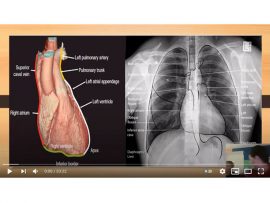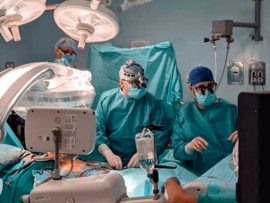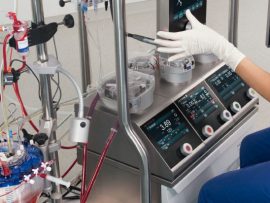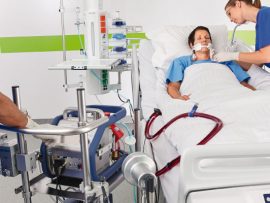Abstract Purpose: Targeted temperature management (TTM) is a standard of care in patients after cardiac arrest for neuroprotection. Currently, the effectiveness and efficacy of TTM after extracorporeal cardiopulmonary resuscitation (ECPR)..
Read MoreAbstract Purpose We compared a restrictive fluid management strategy to usual care among critically ill patients with acute kidney injury (AKI) who had received initial fluid resuscitation. Methods This multicenter..
Read MoreAbstract Background Little is known regarding the effect of cardiopulmonary bypass (CPB) reoxygenation on cardiac function following tetralogy of Fallot repair. We hypothesized that hyperoxic reoxygenation would be more strongly..
Read MoreAbstract Background It is unknown how high and low‐risk cases are distributed among cardiac surgeons of different experience levels. The purpose of this study was to determine if high and..
Read MoreAbstract Background: ECMO is a therapeutic act with a high risk of exposure to diethylhexylphthalate (DEHP), plasticizer from PVC tubings. The replacement of this plasticizer with alternative compounds is recommended but..
Read MoreAula com Dra. Camila Heink. Prof. Elio Carvalho é Biomédico, Microbiologista e Perfusionista pela Unicamp, CLAP e SBCEC. É perfusionista do Hospital de Clínicas da Unicamp e Coordenador do Curso..
Read MoreAbstract THE USE of cardiopulmonary bypass has enabled the delivery of complex cardiovascular surgical procedures. Cardiopulmonary bypass (CPB), at its best, involves a highly technical process that is executed carefully..
Read MoreAbstract This case reports on a 55-year-old male patient who was admitted to the hospital with complaints of fever, cough, vomiting, and loss of taste from 7-8 days before admission...
Read MoreAbstract This case reports on a 58-year-old male patient with a medical history of ulcerative colitis, who was admitted to the Emergency Department with a body temperature up to 40°C,..
Read MoreFrom week 6 of fetal life until birth, the ductus is responsible for most of the right ventricular outflow. Normally, functional closure of the ductus arteriosus occurs by about 15..
Read MoreA 62-year-old man was admitted to our hospital with worsening heart failure. Three months prior to this hospitalization, he had been admitted to another local hospital with de novo heart failure. Transthoracic..
Read MoreDextro-transposition of the great arteries (D-TGA) has undergone a significant evolution in surgical repair, leading to survivors with vastly different postsurgical anatomy which in turn guides their long-term cardiovascular morbidity..
Read MoreAbstract Background Echocardiographic measures of elevated left ventricular filling pressures are associated with an adverse prognosis. The aim of this study was to determine the relationship between acute (ratio of..
Read MoreMono cusp Pulmonary valve technique in Pulmonary Atresia [gallery ids="12916,12919"] Mohamed Gibreel , FEBR (Fellowship of Egyptian Board of Radiology ) Cardiac imaging consultant at Aswan heart center..
Read MoreScimitar sign ,,, Female in the fifth decade with : PAPVD of the right PVs to the IVC then RA. The left PVs drain normally to LA. [gallery ids="12909,12912"]..
Read More26 Y male post TOF repair with "Double Barrel RVOT technique" Native RVOT stenosis,,, RV to PA conduit which shows diffuse degenerative changes , calcifications and filling defects ,,,, Exclude..
Read MoreThe Vanderbilt Faculty team will discuss Single ventricle physiology and how this affects perfusion technique during surgical correction. Our Journal Club explores alternative techniques to long acting cardioplegia..
Read MoreAbstract Background in adult cardiac surgery is commonly achieved with either multidose blood or single-dose del Nido crystalloid cardioplegia. Aim The aim of this systematic review and meta-analysis was to compare..
Read MoreAbstract Background (ARDS) is a type of syndrome characterised by severe respiratory distress and stubborn . Patients with ARDS have a prolonged hospital stay and high mortality rate. Over long-term follow-up, ARDS..
Read MoreAbstract Cardiopulmonary bypass (CPB) is required for the surgical correction of congenital heart defects and incites an acute inflammatory response that impairs endothelial function post-operatively. Therefore, we hypothesized that the..
Read MoreAbstract Objective: Acute kidney injury (AKI) is a major complication after cardiovascular surgery. The unclear etiology of this highly complex event challenges definition, diagnosis and prediction of AKI, and hence..
Read MoreAbstract Baseline cerebral regional saturation (rSO2) measured using the INVOS 5100C (Medtronic, MN, USA) varies widely among patients with cardiac and/or renal diseases. To identify significant correlates of baseline rSO2 and..
Read MoreAbstract The rationale for mechanical circulatory support (MCS) in cardiogenic shock is to restore cardiac output in selected patients when critically low or in case of refractory cardiac arrest. Furthermore,..
Read More




























